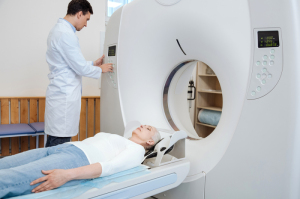by
John R. Fischer, Senior Reporter | May 29, 2018

Microsoft and CWRU partner to enhance
MR diagnoses with quantum computing
Researchers at Case Western Reserve University (CWRU) are seeking to quantify the ability of magnetic resonance fingerprinting (MRF) in accurately detecting and diagnosing tumors and other disease from MR scans in less time by joining forces with Microsoft Quantum, a division of Microsoft that conducts research on quantum computing.
The Washington-based technology giant will apply its quantum-inspired algorithms to CWRU’s MRF research initiative to help manage large amounts of data and solve complex calculations that are required in the MRF initiative. The two will then combine the findings with lessons derived from a previous collaboration on holograms to provide better understanding on the nature and healing of diseases.
“We see incredible possibilities to not only improve the quality of healthcare and medical research, but also demonstrate how quantum computing, machine learning and mixed reality can be combined to turn challenges of the past into solutions of the future,” Todd Holmdahl, corporate vice president of Microsoft Quantum, said in a statement.



Ad Statistics
Times Displayed: 1227
Times Visited: 6 Fast-moving cardiac structures have a big impact on imaging. Fujifilm’s SCENARIA View premium performance CT brings solutions to address motion in Coronary CTA while delivering unique dose saving and workflow increasing benefits.
Utilizing a constantly varying sequence of pulses, MRF acts as a single, unified exam that detects complex changes that signify physical alterations of a substance, or early indicators of disease such as cancer or heart trouble, allowing for rapid and repeatable characterizations of tissue to detect which are plagued by disease earlier and faster. CWRU first began researching the concept
in collaboration with Siemens Healthineers.
Orchestrating such an approach requires managing multiple values simultaneously and solving complex calculations, tasks that would take years to be completed with a conventional computer that can hold only binary digits.
Quantum computing can perform these tasks and offers exponentially greater computing power than today’s computers. However, the unstable nature of these numbers, known as quantum bits or qubits, can cause severe problems that stall calculations or erase information, preventing researchers from finding the best sequence of pulses and readouts to achieve the best scan efficiency or acquisition optimization for identifying a particular disease.
Microsoft is challenging this problem with its approach to map the problem into a form that quantum computers can handle and one that enables qubits to remain steady and function more reliably.

